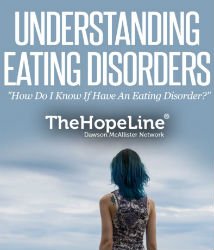Anorexia Nervosa
Anorexia exists when a person severely cuts down the amount of food they eat. They might experience dramatic weight loss which can be life threatening, while still believing they need to lose more. They may also vomit (but not binge). Anorexia is an eating disorder most commonly found in teenage girls.
Anorexia is characterised by:
- Weight loss – the person severely restricts food intake and/or undertakes excessive exercise
- Intense fear of becoming fat
- Distorted view of body shape – believing all or parts of the body are fat when they are not
- For females – loss of periods(or irregular periods or delayed menarche – first period)
How much weight does the person have to lose for it to be serious?
This will depend on the individual. If the person is young, it may be that they don’t actually lose a lot of weight but they fail to grow and develop. For most females when their periods stop or become irregular it is a good sign their body is underweight and a sign that the body is slowing down or preventing non-life sustaining functions. An individual is seriously underweight if they weigh less than 85% of what is considered normal for their age and height or if their BMI is under 18 (BMI = weight (kg) divided by height (m²)). It is also important to consider the body build and weight history of the individual in determining whether they are underweight.
Intense fear of becoming fat
Just as some people have an irrational fear of spiders and will go to great lengths to avoid them; it is similar for someone with anorexia in regards to food. Often just talking about what they should be eating can become very painful and upsetting. The avoidance of food and of eating is because of this intense fear (however due to being so hungry they will also often become very obsessed with food and of feeding others).
Distorted view of body shape
For many people with anorexia they will not have an accurate view of their body and believe themselves to be fat when they are in fact underweight. This distorted view of their bodies may apply to the whole body or just specific parts, eg, the stomach, thighs and bottom.
Who suffers from Anorexia?
Anorexia Nervosa is predominantly a female disorder, but about one out of every ten victims are male. It most commonly starts in the early teens but cases have been recorded as young as eight years old. The most susceptible people seem to be in the 15 – 23 age group, come from middle class and in particular, professional families which are extremely close and over-protective, and where there is a high academic and moral sense. The individuals themselves are commonly perfectionists and drive themselves to excel in both physical and mental pursuits.
How Anorexia affects the family
Social withdrawal is characteristic and friends of the family notice the change in the person who becomes self absorbed, refuses social invitations and becomes obsessionally hard working. Irritability is usually most marked with the family and because of this, tension and arguments about food intake are usual. The family, if not previously food and weight conscious, will soon become so and often parents gain weight in their attempts to make the person eat more. As they become more and more emaciated, so the stress and tension in the home builds up, particularly with the parents. It is common for an anorexic and their mother to become very involved with each other during this syndrome.
Getting help
Very few people recover from anorexia without some sort of help. The person will need to learn how to eat normally again and undergo therapy to sort out their thoughts and feelings around food and their body.
Signs and Symptoms of Anorexia
NOTE: Not everyone will display all signs
Behavioural Signs
With Food
- Repeatedly avoiding meals (saying “I’ll eat later”, “ I ate with friends”)
- Refuse to eat with the family or in front of people
- Reduction in amount and types of food eaten
- Not wanting to eat what everyone else is having
- Lie to family and friends about how much they have eaten
- Become very deceptive around food and eating – ie. they may eat a normal size dinner with the family but this could be all they have eaten that day
- Eating meals but extremely restless or guilty after the meal as their anxiety grows
- Pre-occupation with food and feeding others (counting calories, reading recipes)
- Unusual eating habits (eg. preference for foods of a certain texture or colour, eating with a teaspoon, adding lots of condiments)
- Compulsively arranging food and/or cutting into tiny pieces
- Rigidity around food – only eating particular types of food or at certain times
- Eating unusual mixtures of food
- Denying hunger
- Dieting when not overweight
Other
- Frequent weighing
- Talking about new diets and the wish to be thinner
- Increasing isolation, disinterest in social activities, work and /or study
- Social Withdrawal and intolerance of others
- Excessive exercising
- Wearing baggy clothes
- Deny being ill
Emotions & Thoughts
- Distorted body image: believes they are fat even when very thin
- General dissatisfaction with appearance and figure. Expressing the wish to change
- Extreme concern about appearance, both physical and behavioural
- Thinking in extremes (If I’m not thin, I’ll be grossly obese)
- General apathy and/or depressive outlook on life
- Moodiness, irritability, depression, argumentative – especially around meal times
- Inflexibility
- Oversensitive to criticism
- Feel very guilty about eating
- Have black and white thinking about food. ie good food & bad food
- Have low self esteem
- Have a need for perfection
- Have periods of depression
Physical
Signs of Starvation/Malnutrition/Underweight
- Significant weight loss in the absence of a related illness. However, not always – with young people it may be the case that they just don’t grow and put on weight
- Thinning of Hair or hair loss, and/or appearance of fine raised white hair (lanugo) on the body
- Bloated appearance of stomach
- Yellowish appearance of the palms or soles of feet
- Dry, pale, pasty skin
- Loss of periods (amenorrhea) or irregular periods









Recent Comments